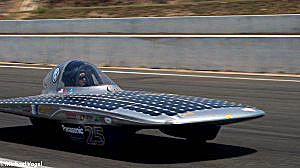CalSol zips to the finish in Aussie solar race
UPDATE
CalSol, UC Berkeley’s Solar Vehicle Team, successfully completed the 3,000-kilometer trans-Australia World Solar Challenge in Adelaide on Saturday, and went out to celebrate while waiting for results of its competition against 36 other solar car teams from around the world. competition.
The team posted details of its grand finale — along with all its technical difficulties and triumphs — on CalSol’s blog. The latest updates can also be followed through the team’s website and interactive map and Twitter feed.
This was the first time CalSol has competed in the World Solar Challenge, and the race is the culmination of two years of work by 75 undergraduate students to design and build Impulse, a single-seat, low-to-the-ground all-solar vehicle. Impulse can go 70 miles an hour or more, all on solar power — but only if the sun cooperates.
The race started at 8:30 a.m. (local time) on Sunday, Oct. 16, in Darwin, in the north, and covered 1,890 miles on public highways before reaching the finish line in Adelaide.
With 37 entries, this is the biggest field that’s ever competed in the World Solar Challenge. Berkeley’s was one of four teams from American universities that are taking part; the others are from Stanford, MIT and the University of Michigan. Campus sponsors include CITRIS and the Engineering Student Council.
OCTOBER 13, 2011
CalSol, UC Berkeley’s Solar Vehicle Team, is on the ground in Australia, sweating through last-minute preparations for the upcoming transcontinental race against 36 other solar cars from all over the world. The race starts this weekend, and can be followed through the team’s website and interactive map, blog and Twitter feed.

It’s the first time CalSol has competed in the World Solar Challenge, and the race is the culmination of two years of work by 75 undergraduate students to design and build Impulse, a single-seat, low-to-the-ground all-solar vehicle. Impulse can go up to 70 miles an hour, all on solar power.
The race starts at 8:30 a.m. (local time) on Sunday, Oct. 16, in Darwin, in the north, and will cover more than 1,890 miles (3,000 kilometers) on public highways before reaching the finish line in Adelaide, in the south, five to seven days later.
This is the biggest field that’s ever competed in the World Solar Challenge. Berkeley’s is one of four teams from American universities that are taking part; the others are from Stanford, MIT and the University of Michigan. Campus sponsors include CITRIS and the Engineering Student Council.
